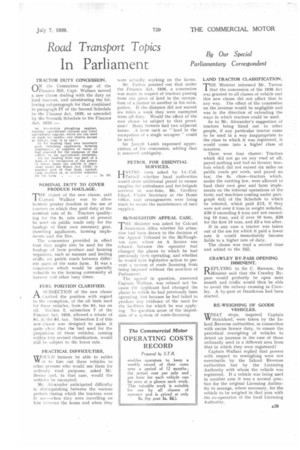Road Transport Topics
Page 57

If you've noticed an error in this article please click here to report it so we can fix it.
In Parliament
NOMINAL DUTY TO COVER PRODUCE HAULAGE.
THE object of the new clause, said Captain Wallace was to allow farmers greater freedom in the use of tractors on which they paid duty at the nominal rate of 5s. Tractors qualifying for the 5s. rate could at present be used on public roads only for the haulage of their own necessary gear, threshing appliances, farming implements and the like.
The concession provided in effect that they might also be used for the haulage of farm produce and farming requisites, such as manure and feeding stuffs, on public roads between different parts of the same farm. It was a concession which would be specially valuable to the farming community at harvest and other busy times.
FUEL POSITION CLARIFIED.
A SUBSECTION of the new clause clarified the position with regard to the exemption, of the oil fuels used for these vehicles, from the 9d. tax on oil. Section 2, subsection 7 of the Finance Act, 1935, allowed a rebate of 8d. in the 9d. tax, Subsection 2 of this new clause was designed to make it quite clear that the fuel used for the propulsion of these vehicles, coming within this revised classification, would still be subject to the lower rate.
PRACTICAL DIFFICULTIES.
VIUOULD farmers be able to sublet VV or to hire out these vehicles to other persons who would use them for ordinary road purposes, asked Mr. Bevan and, in that case, would the vehicles be exempted.
Mr. Alexander anticipated difficulty in distinguishing between the various periods during which the tractors were in use—when they were travelling on hire between the hums and when they
were actually working on the farms.
Mr. Turton pointed out that under the Finance Act, 1936, a concession was made in respect of tractors passing from one piece of land in the occupation of a farmer to another in his occupation. If the distance did not exceed six miles a week they were exempted from all duty. Would the effect of the new clause be subject to that provision? Many farmers had two adjacent -farms. A term such as " land in the occupation of a single occupier " could be used.
Sir Joseph Lamb expressed appreciation of the concession, adding that it removed ambiguity.
PETROL FOR ESSENTIAL SERVICES.
HAVING been asked by. Lt.-Col. Tufnell whether local authorities would store additional petrol to ensure supplies for ambulance and fire-brigade services in war-tithe, Mr. Geoffrey Lloyd., Under Secretary at the Home Office, said arrangements were being made to secure the maintenance of such supplies.
MeNAUGHTON APPEAL CASE.
THE Minister was asked by Colonel
Sanclentan Allen whether his attention had been drawn to the decision of the Appeal Tribunal in the McNaughron case, where an A licence was refused because the operator had changed the places to which he had previously been operating, and whether he would take legislative action to prevent a system of route licensing from being imposed without the sanction of Parliament.
The appeal in question, answered Captain Wallace, was refused not because the applicant had changed the places to which he had previously been operating. but because he had failed to produce any evidence of the need for the facilities for which he was applying. No question arose of the imposition of a system of route-licensing.
LAND TRACTOR CLASSIFICATION.
THE Minister informed Mr. Turton that the concession of the 1936 Act was granted to all classes of vehicle and this new clause did not affect that in any way. The effect of the concession on the .revenue would be negligible and was in the direction of extending the ways in which tractors could be used.
As to Mr. Alexander's suggestion of tractors being hired out to other people, if any particular tractor came to be used in a way inappropriate to the class in which it was registered, it would come into a higher class of taxation, There were four classes: Tractors which did not go on any road at all; payed nothing and had no licence; tractors which did not exceed six miles on public roads per week, and payed no tax; the 5s. class—tractors which, under the existing law, were allowed to haul their own gear and farm implements on the internal operations of the farm; and machines coming under paragraph 4(d) of the Schedule to which he referred, which paid £12, if they were not over 5 tons in weight unladen, 220 if exceeding 5 tons and not exceeding 10 tons, and if over 10 tons, 220 for the first 10 tons, and 22 a ton after.
If in any case a tractor was taken out of the use for which it paid a lower rate it would immediately become liable to a higher rate of duty.
The clause was read a second time and added to the Bill.
CRAWLEY BY-PASS OPENING IMMINENT.
REPLYING to Sir C. Rawson, the Minister said that the Crawley Bypass would probably be open next month and traffic would then be able to avoid the railway crossing in Crawley. A by-pass at Handcross had been started.
RE-WEIGHING OF GOODS VEHICLES. WHAT steps, inquired Captain W Strickland, were taken by the In land Revenue authorities, in connection with excise licence duty, to ensure the periodical reweighing of vehicles to detect an increase in the case of those ordinarily used in a different area from that in which they were registered?
Captain Wallace replied that powers with respect to reweighing were not exercisable by the Inland Revenue authorities but by the Licensing Authority with whom the vehicle was registered. If a vehicle was being used in another area it was a normal practice for the original Licensing Authority to arrange, where necessary, for the vehicle to be weighed in that area with the co-operation of the local Licensing Authority.




















































































